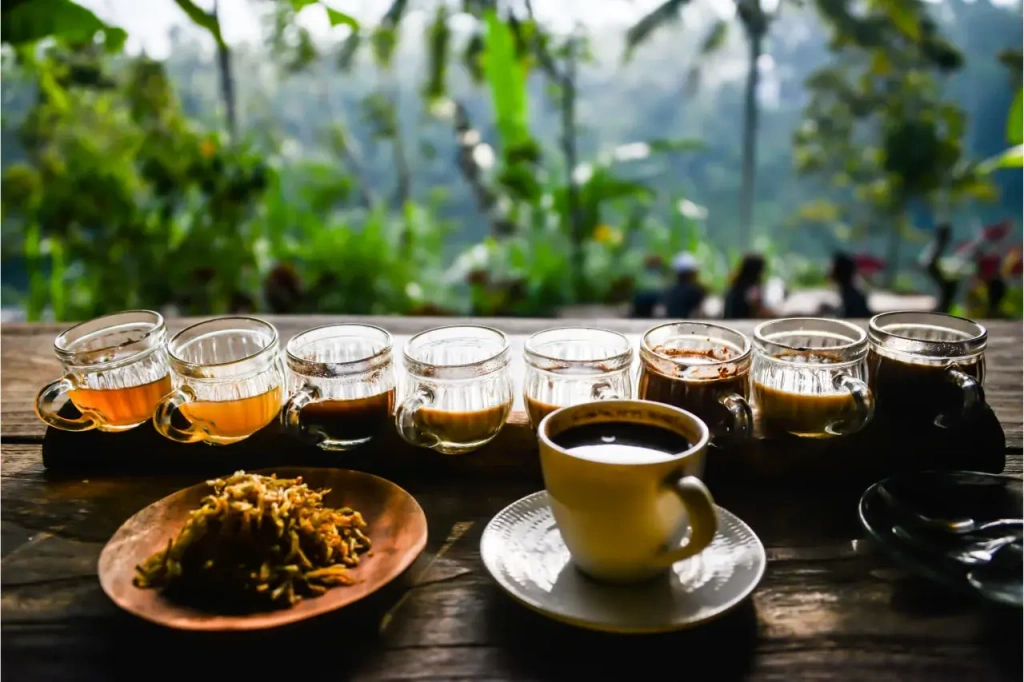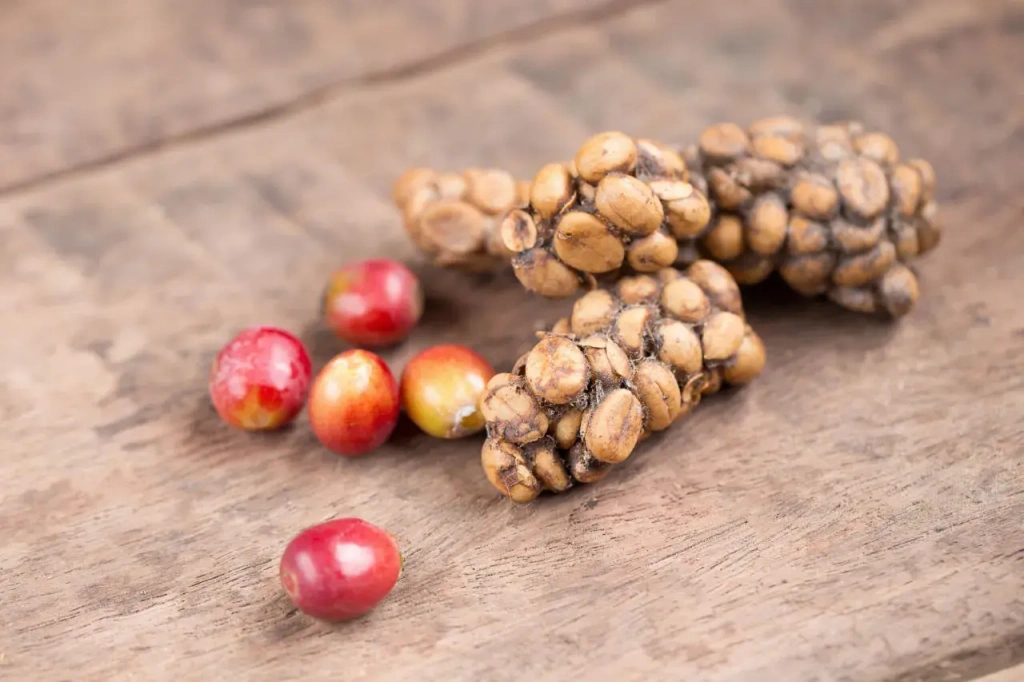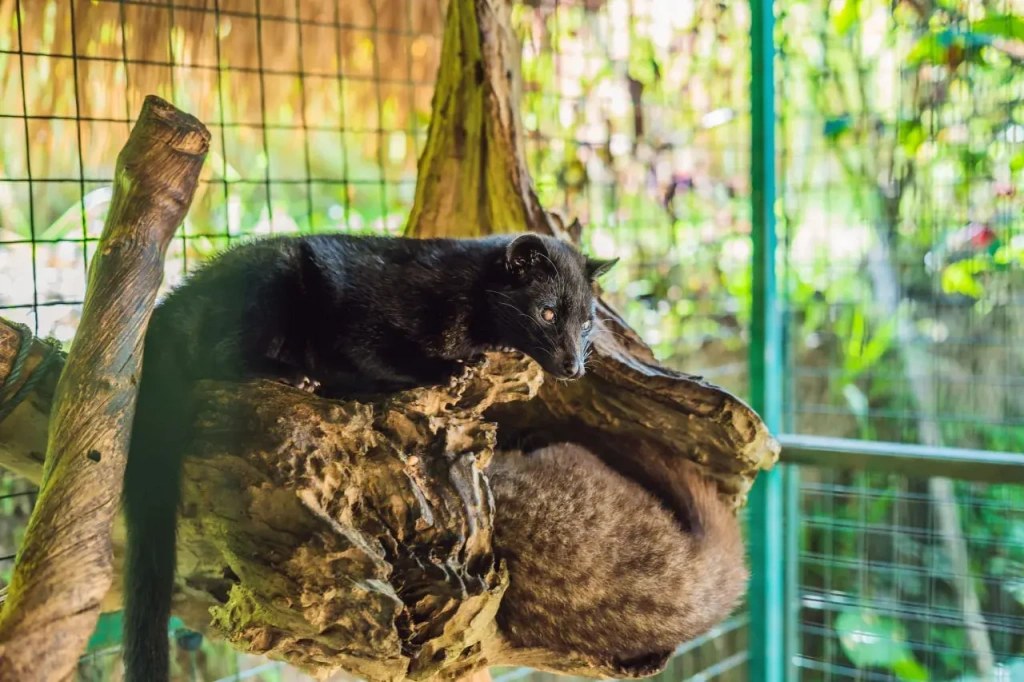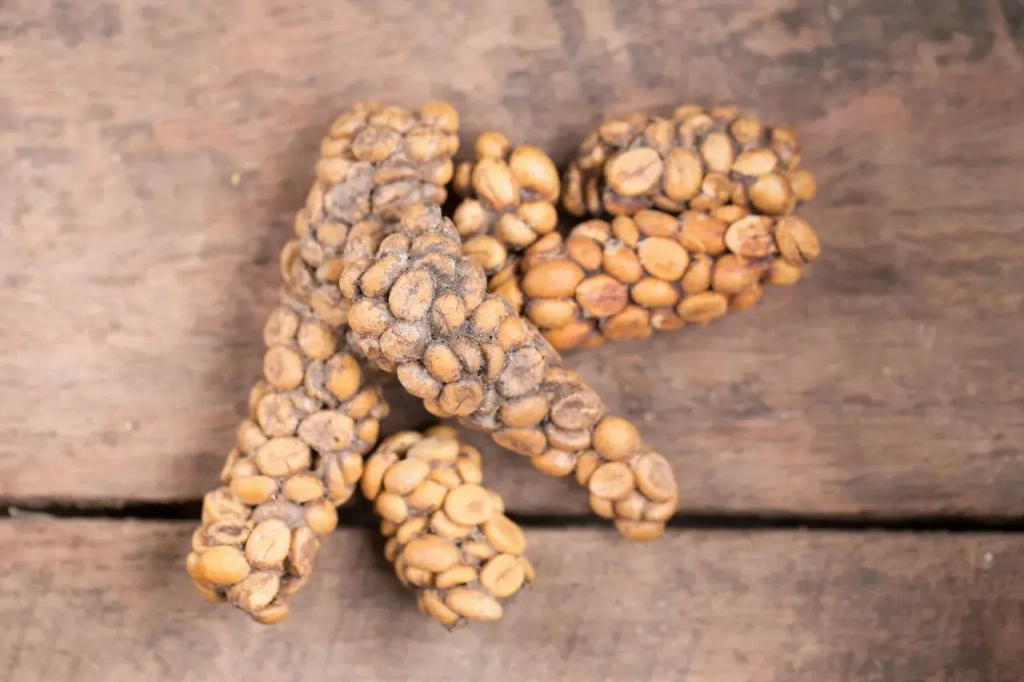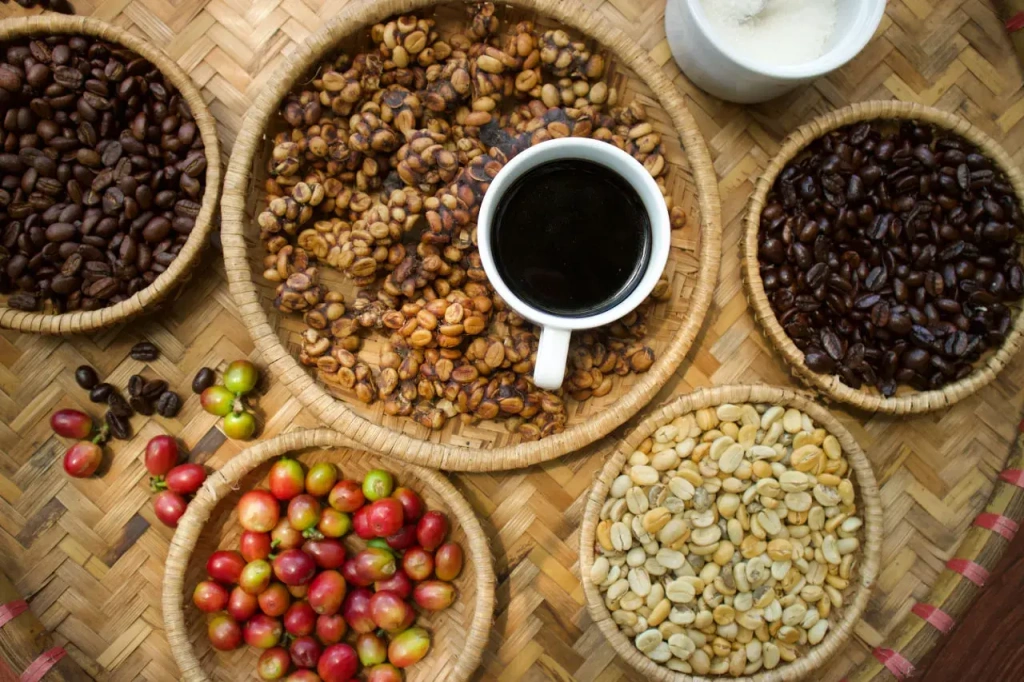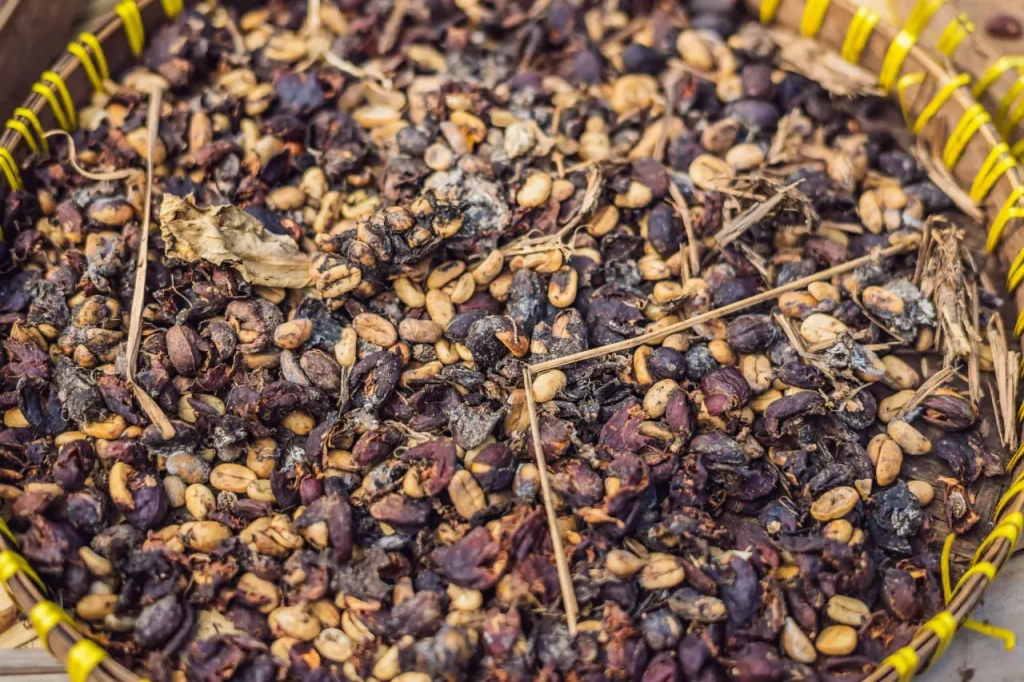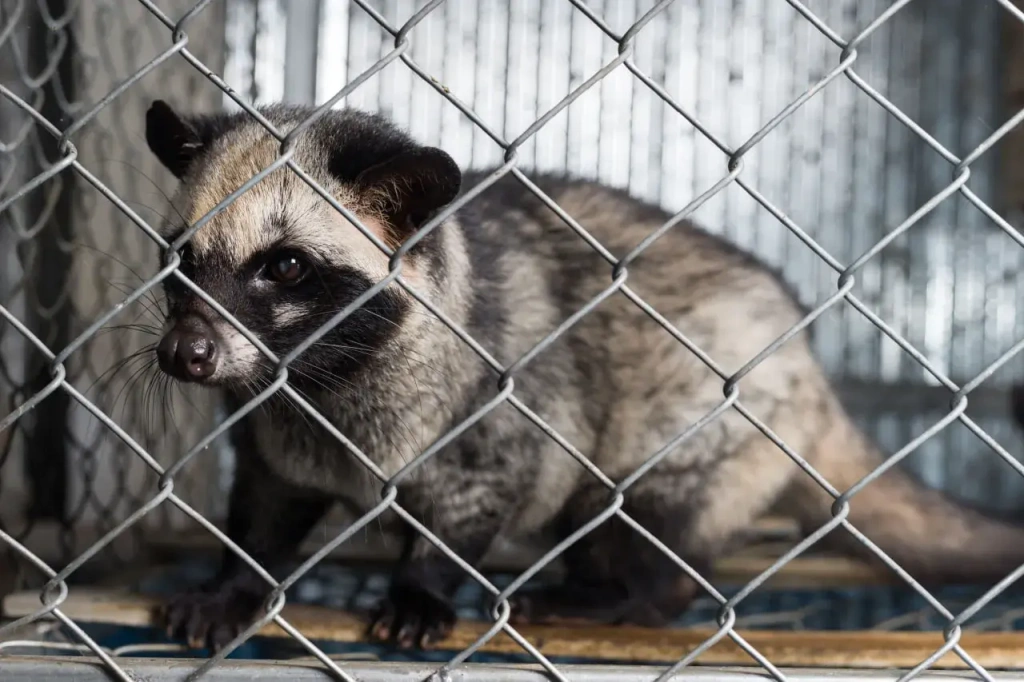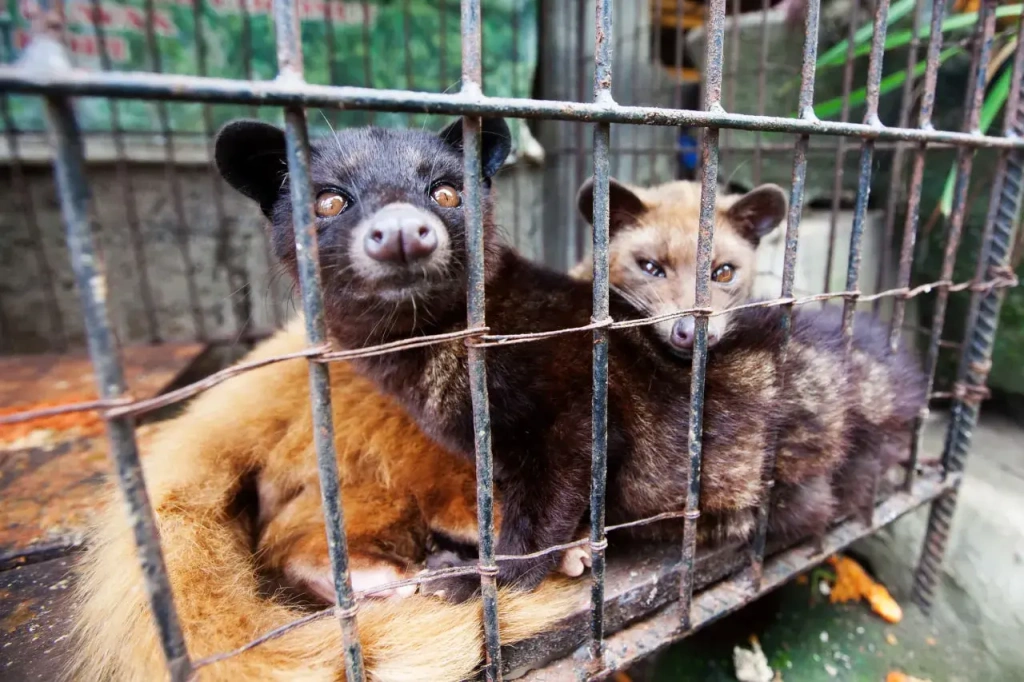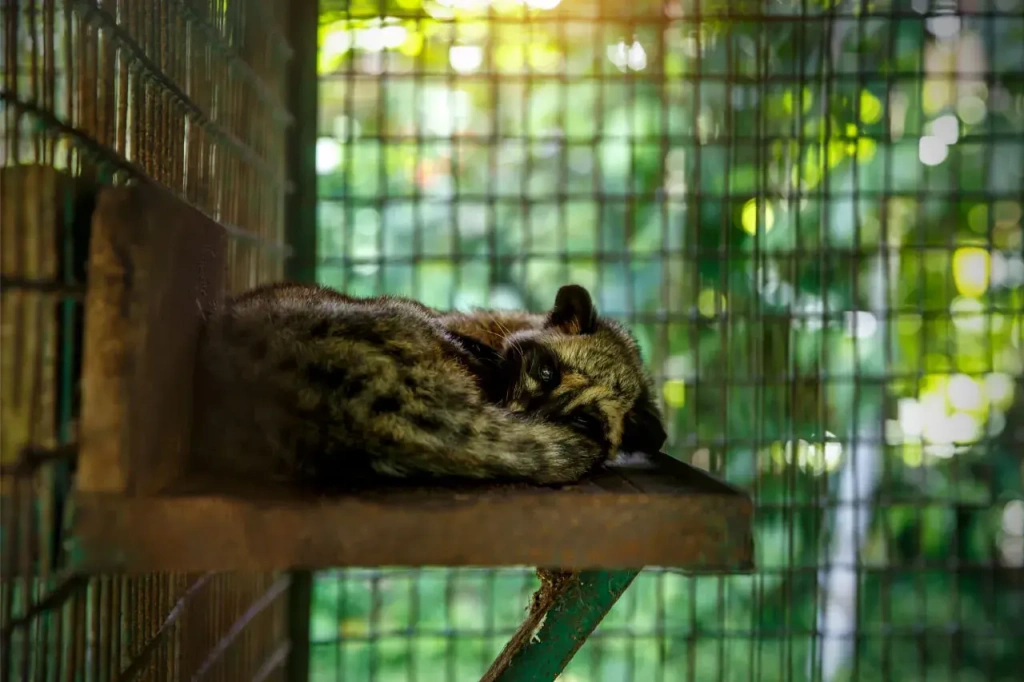The term comes from the Indonesian language. Luwak is the local name for the Asian palm civet, and kopi in Indonesian means "coffee." coffee, along with "Black Ivory" is a trademark of Arabica coffee. The coffee cherries are passed through the digestive tract of elephants. This coffee is only produced in Thailand on one elephant farm. A cup of this coffee costs 50 US dollars, and a kilogram of beans will cost approximately 2000 dollars or more. is an exotic product and the most expensive coffee in the world. It is consumed by gourmets who pay up to a hundred dollars for a cup of this beverage. But not everyone knows the ugly facts about Kopi Luwak hidden by coffee manufacturers and sellers. Animals who produce Kopi Luwak are kept in cages, suffer, and die early. Marketers contribute to the deception by talking about the cute behaviors of civets and how their coffee beans are ethically sourced from the wild. The question arises: Is the end product worth the ethical and environmental compromises? Let's uncover the truth.
In previous articles, we have already shared the history of coffee, from the first berries discovered in Ethiopia to modern coffee shops scattered around the world. We have also summarized the results of our search for the best Arabica, which can be found in different countries. As an example, we mentioned coffee from Tanzania, where excellent beans are collected, especially Tanzanian peaberry. In general, we know a few things about coffee, and now we will share with you:
- What is Lopi Luwak coffee?
- Why Kopi Luwak coffee is so expensive?
- How is Kopi Luwak made, and who suffers in the process
- What is the taste of Luwak coffee?
- Is it ethical to buy Kopi Luwak coffee?
What is Kopi Luwak coffee?
Kopi Luwak is a type of Arabica obtained from beans that have passed through the digestive tract of animals. These animals are Asian palm civets (Paradoxurus hermaphroditus), which inhabit Southeast Asia. Otherwise known as musangs or toddy cats. In nature, they live in trees, consuming insects and various fruits, including coffee berries. The beans pass through the civets' digestive system, undergo partial fermentation, and are then collected by humans. They are, of course, found in the animals' feces. They are then washed, dried, roasted, and brewed into coffee. Some claim that the resulting drink has a unique taste.
Which countries produce Kopi Luwak coffee?
Countries producing Kopi Luwak include Indonesia, the Philippines, Vietnam, China, and India. Historically, the tradition of collecting coffee beans in animal feces originated in Indonesia, where the Dutch established the first coffee plantations, buying coffee in Yemen. It is believed that farm owners prohibited native farmers from collecting coffee from the fields, so the poor laborers roamed around and picked undigested coffee beans from mammalian excrement. This is how they obtained beans for making coffee.
Civets - animals that make Kopi Luwak
The coffee eaters have always been the same animals - civets. These are forest animals similar to mongooses. Civet is the commonly used English name, but in Indonesia, the animal is called luwak. They are mammals from the Viverridae family. Sometimes civets are compared to cats because of their appearance, or even called palm toddy cats. Cats and civets are indeed similar in size but belong to different biological families.
Civets usually spend their days in trees or on rocks, and at night they hunt small mammals and insects, as well as consume plant food. They like berries, fruits, and palm flower sap. Some of their favorite berries happen to be coffee. They eat them, but the beans are not fully digested, instead, they undergo partial fermentation, so civets leave them in abundance around coffee plantations.
How Kopi Luwak coffee beans are produced?
Long ago, people noticed that civets in the wild feast on coffee berries, choosing the ripest and best ones. The berry passes through the animal's entire digestive tract, interacting with the gastric juices and natural chemicals. The pit, which we often call a coffee bean, comes out with the feces preserving its shape. Partly it undergoes fermentation in the intestine, which allegedly changes its initial taste. Its amino acid composition changes, along with its aroma. Recent studies have shown that the caffeine that civets consume with the berry pulp does not harm them.
How is Kopi Luwak coffee processed?
It is believed that coffee beans that have passed through the stomach and intestines become less bitter after the washing, drying, and roasting process. This is confirmed by laboratory studies of the beans. They contain less caffeine and have different physical characteristics - beans fermented by civets are harder and more brittle.
After gathering the beans, which are still to be found by wandering along forest paths, they undergo washing and drying, just like those collected from trees. Then, they are roasted. During the preparation stage, some coffee enthusiasts, but more often Kopi Luwak producers, praise its unique aroma. They claim its rich taste surpasses that of coffee obtained by traditional methods. Some mention a lemony sharpness with a delicate aroma. Others describe it as heavy and rich, boasting caramel and chocolate undertones. Yet, some find Kopi Luwak's taste earthy and musty. As with all coffees, the roast level and brewing method will impact the flavour of the final drink.
Nevertheless, this coffee has piqued the interest of many people for decades. Gourmets want to taste it, having already tried all other varieties and brands of the best coffee. Bored millionaires hunt for exotic and expensive luxury drinks. It is talked about in every corner of the world. How did it come about that coffee obtained from the excrement of Asian animals is so popular and desired? Behind this lies not only the exotic origin of the beans but also a very successful marketing campaign.
The success story of civet coffee beans
The success story of civet coffee began with a small article in the 1981 issue of National Geographic. It casually mentioned an unusual coffee whose beans were collected from the excrement of Malayan civets. Due to passing through these animals' digestive tracts, the taste of the coffee after preparation was said to be unusual.
Tony Wild and the first Kopi Luwak
That article was read by a buyer working for a Specialty coffee refers to the highest quality grade of coffee, distinguished by its exceptional taste and unique characteristics. It is meticulously sourced, processed, and roasted to highlight the distinct flavors inherent in each bean. Only some batches of coffee that have undergone a 15-step sorting process and a special processing method can qualify for this category. company, Anthony Wild is the author of the book "Coffee: A Dark History." As a professional trader and coffee historian, Wild explores both the positive and strongly negative impacts of coffee on humanity in his 2005 book. For instance, he discusses how the coffee consumption culture influenced the creation of the Lloyd's of London insurance market. Simultaneously, the burgeoning coffee industry in the 18th century Americas contributed to the intensification of the slave trade. All of this is detailed in our article "The History of Coffee" on the Altezza Travel website blog. Over time, Mr. Wild would become the director of an English coffee company. Then, he decided to procure this exotic coffee. He became the first person to bring Kopi Luwak to the West. It was just one kilogram. Quickly, the story of this coffee caught the attention of local radio stations and newspapers. It became a topic of conversation throughout Yorkshire, and soon the news spread nationwide across British television.
The fame of Kopi Luwak grows
The news of the exotic coffee then spread worldwide. It was featured on the American morning show CNN News. Later, the famous television host Oprah Winfrey discussed it. Civet coffee, obtained from the excrement of civets, became known all over America. Finally, in 2007, Kopi Luwak appeared in a popular movie film "The Bucket List".
In the plot, the billionaire and misanthrope played by Jack Nicholson constantly enjoys a cup of coffee called Kopi Luwak. He doesn't know much about its origin; he simply indulges in everything expensive and unusual. The erudite friend, portrayed by Morgan Freeman, eventually opens his eyes to the truth. Both characters await imminent death from cancer. To stave off madness while awaiting the end, the men decide to fulfill their dreams: racing cars, climbing Everest, seeing the Egyptian pyramids and the Great Wall of China, and going on safari in Tanzania.
By the way, we call the beautiful country of Tanzania our home, organizing safari tours in the country's stunning national parks. If you have such a dream, we'll help you fulfill it. Imagine driving across the savannah in a safari car, witnessing the Great Migration of animals in the Serengeti, and camping under the African starry sky. Essentially, you can replicate everything Nicholson and Freeman did, except shooting animals. We don't organize such cruel "entertainment." Instead, we can easily arrange a tour to a coffee farm on the slopes of Kilimanjaro.
So, what about the movie and civet coffee? Thanks to the intriguing plot, the stellar performances of the actors, and its success at the box office, many people worldwide learned about civet coffee. All of this contributed not only to the popularity of beans from Indonesia but also to increased sales and rising prices.
How much does Kopi Luwak coffee cost?
In our 2024 analysis of the civet coffee market, we explored its pricing and found a range of offers. Vendors present options from $130 to $2,000 per kilogram of civet coffee beans.
Typically, authentic Kopi Luwak fetches prices ranging from $600 to $1,500 per kilogram, omitting suspiciously inexpensive offerings that may signal counterfeit products.
Packages sold at lower prices are unlikely to contain genuine civet coffee beans. The prevalence of counterfeit products, or blends with only a fraction of claimed content, is well-documented in the market. However, it's also noteworthy that a higher price tag does not necessarily ensure 100% Kopi Luwak content in the package.
Why is Kopi Luwak coffee so expensive?
Firstly, collecting such coffee in large quantities is challenging. This is because there are significantly fewer wild civets eating coffee cherries than there are coffee plantations worldwide growing regular coffee. Moreover, these beans still need to be found in piles of excrement. Searching and collecting takes a lot of time. Some say that only about 500 kilograms of Kopi Luwak beans are produced per year, which explains the high price. However, there's much more of it on the market, and only a fraction of such coffee is real wild Kopi Luwak.
The bitter truth about coffee from feces, or why you shouldn’t drink it.
When coffee producers realized a high demand for exotic coffee from Asia, they simplified the process. It's much easier to catch a forest animal, put it in a cage, and feed it coffee berries than to spend time searching for and collecting beans. That's exactly what many companies in Southeast Asia did in the following years.
Civets in captivity
Today, there are several animal farms where thousands of fluffy civets are kept in cages of varying discomfort. There are truly terrible farms where owners don't care about the animals at all. They sit in cramped and dirty cages, experiencing constant stress. They're forcibly fed only coffee berries, although, in their natural environment, the civets' diet is quite diverse. The negative impact of such feeding is confirmed by numerous cases of animal diarrhea, complicated by bloody discharge. It's known that civets placed in the same cage fight and even gnaw their limbs from stress. Kept in such conditions, many animals die prematurely. In addition, the wild civet population is under threat because many of those animals are caught to be exploited in coffee production.
We once had the opportunity to visit one of these farms on a "civet coffee production" tour in Thailand. It was unpleasant for us to witness animal abuse, so we left the farm without completing the tour.
Marketing myths of Kopi Luwak sellers
If you read the selling texts of civet coffee vendors, you'll be touched. It often goes something like this:
“Adorable, fluffy creatures roam freely somewhere in the forests of Asia, seeking out the finest, ripest coffee cherries and relishing their treats. Oh, what a marvelous wonder of nature! Local trackers scour civet trails for coffee beans, gathering them and sending them for meticulous processing. The unique flavor and aroma of this exclusive coffee roasted to the perfect level surpass that of any other coffee. But if you love coffee and appreciate the finest quality, ordinary products won't suffice. Indulge in this exclusive luxury coffee with a great flavor! Naturally, it comes at a higher price than regular Arabica. Yet, its collection process is painstaking, and its availability is naturally limited. Rest assured, our coffee is harvested in accordance with all ethical standards imaginable. The beans are sourced from wild civets thriving in their natural habitat.”
It's conceivable that even many employees of supplying companies believe in these marketing legends. However, ten years ago, it was estimated that despite claims of 500 kilograms per year, around 50 tons of civet coffee were sold worldwide annually. And now, probably even more, as farms have appeared not only in Indonesia but also in Thailand, Vietnam, China, India, and the Philippines.
Initiatives to stop the production of Kopi Luwak
Anthony Wild, who initiated this coffee hysteria, has been plagued by guilt for many years. In 2013, he launched a campaign to stop the global trade in civet coffee, debunk myths about this coffee and its "special" taste, and end the suffering of animals. But the will of one person or even an activist group is powerless against powerful marketing pressure and the desire to make big money relatively easily. Unfortunately, there hasn't been much news about the fight against this Kopi Luwak industry since then.
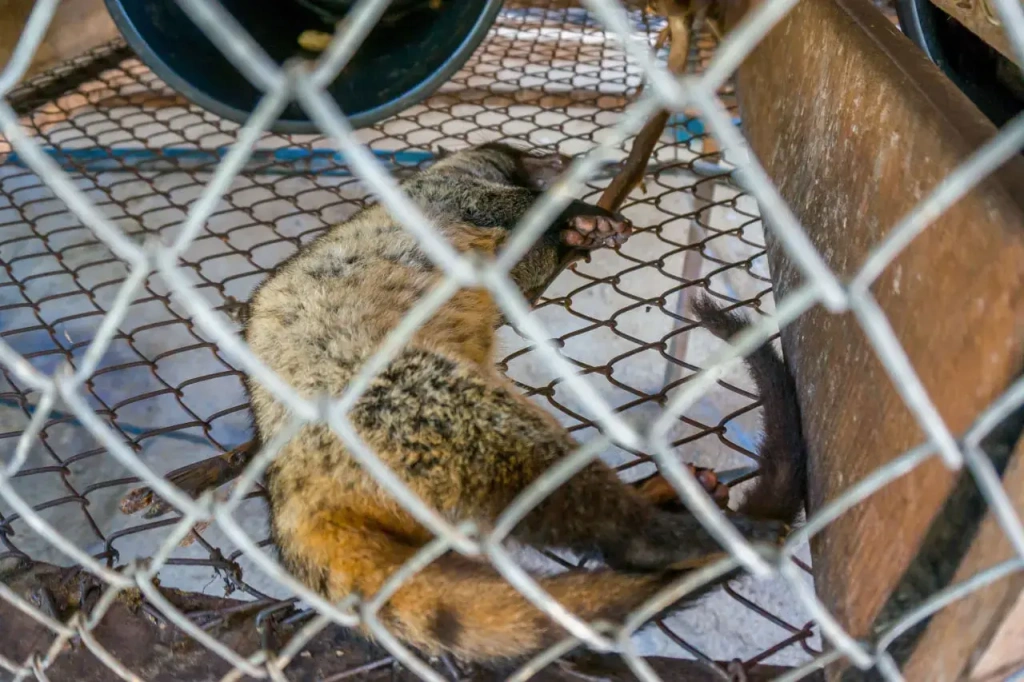
However, information can be found that similar initiatives are launched from time to time in other parts of the planet. For example, in Brazil, coffee is produced from beans collected in bird droppings. We're talking about Jacu Bird coffee. In the local language, the bird is called "jacu," and in English, we call it the Chestnut-bellied Guan. In Costa Rica, coffee is produced with the help of bats. A similar farm has also opened in Madagascar. But the most famous and expensive coffee after Kopi Luwak remains Black Ivory, the beans of which are collected from Thai elephant dung. Its taste is considered soft and delicate, devoid of bitterness.
What does Kopi Luwak coffee taste like?
Civet coffee is often described as soft, not bitter, delicate, and earthy. Its aroma is also more delicate compared to classic varieties and brands. It is often praised by newcomers and enthusiasts of exotic drinks. But what do professional Cuppers are called professional experts who study coffee beans and taste the finished beverage, assigning each batch of coffee a score on a 100-point scale. and connoisseurs say?
Professional tastings of Kopi Luwak
Professionals are almost unanimous in their opinion of the taste of civet coffee: they consider it bad coffee, devoid of acidity and other characteristics inherent in true specialty coffee. Its earthy taste and syrupy body indicate low quality. It simply does not taste good, and the professional community openly admits it. Professionals who tried tasting Kopi Luwak confirm that fact.
Members of the International The Specialty Coffee Association includes coffee producers, as well as exporters, roasters, sellers, and suppliers of specialized equipment. The association holds championships worldwide and trains cuppers — specialists who can blind-taste coffee according to the organization's developed regulations on a 100-point scale. conducted a comparative cupping with lots that were not labeled. All the cuppers knew was that there were several anonymous specialty drinks. Civet coffee scored the lowest number of points.
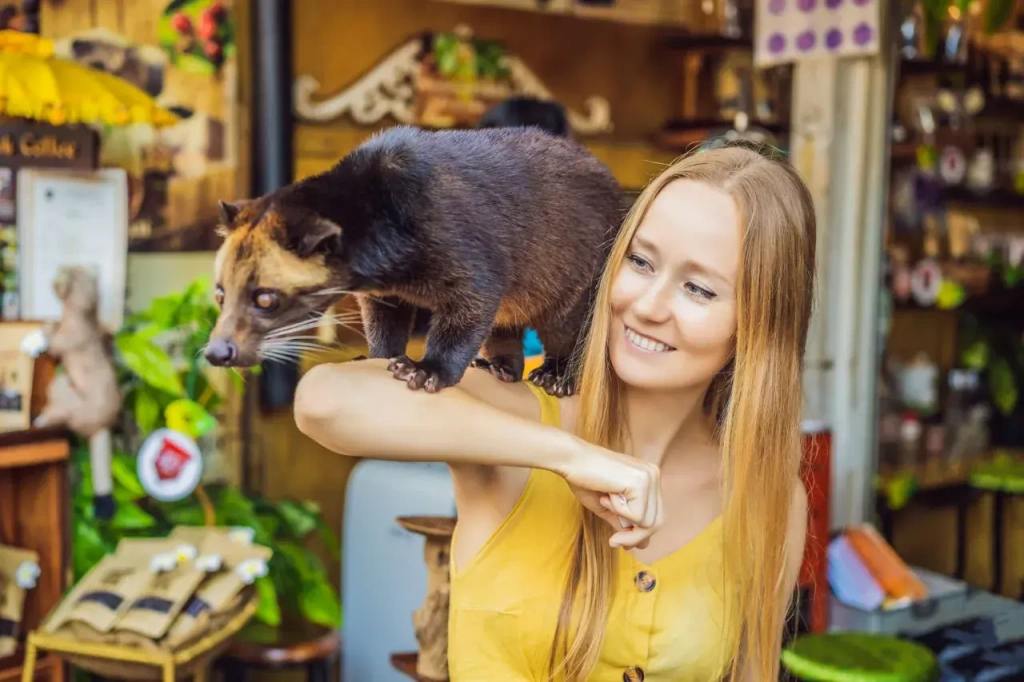
It seems that it's bought only as a curiosity, as something with an unusual origin story. There's no good taste or other product features behind it.
In summary, it can be said that civet coffee has at least three problems:
- it's not worth the money, having a bad or mediocre taste
- it's often sold heavily mixed with ordinary coffee from plantations
- Animals suffer in Kopi Luwak production
If you absolutely want to try and drink coffee whose beans are collected from animal excrement, the decision is yours to make. We recommend not buying civet coffee and not supporting an industry that resorts to cruel treatment of animals.
We couldn't find any animal protection funds specifically addressing this issue. As soon as we find such projects, we'll update our article, talk about civet protection programs, and share information on how we could help them.
All content on Altezza Travel is created with expert insights and thorough research, in line with our Editorial Policy.
Want to know more about Tanzania adventures?
Get in touch with our team! We've explored all the top destinations across Tanzania. Our Kilimanjaro-based adventure consultants are ready to share tips and help you plan your unforgettable journey.















